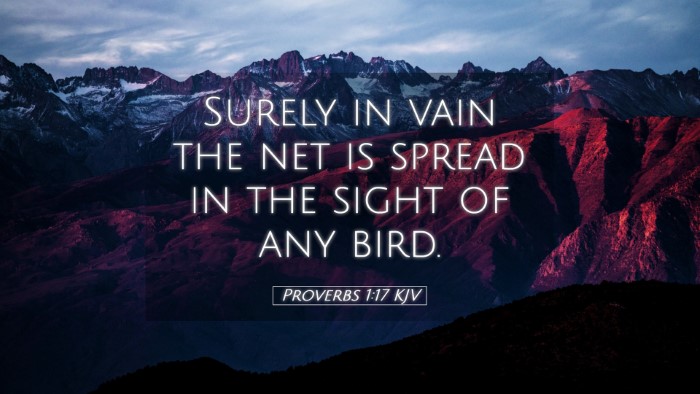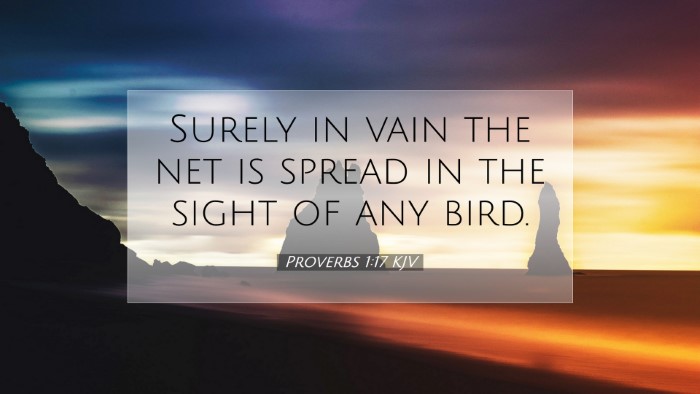Commentary on Proverbs 1:17
Verse: "Surely in vain the net is spread in the sight of any bird."
Proverbs 1:17 provides profound insight into the nature of wisdom, caution, and the futility of deception when the truth is evident. In this brief but powerful verse, we are presented with a metaphor that illustrates the inherent foolishness of being ensnared by something that is openly observable. Below is a synthesis of interpretations and insights from several public domain commentaries.
Overview of the Verse
At a glance, Proverbs 1:17 uses the imagery of a hunter spreading a net for birds, which highlights the wisdom literature's emphasis on perception. The verse serves as a warning regarding the foolishness of being caught by obvious traps—particularly those which seek to exploit one’s naivety or ignorance.
Interpretive Insights
Matthew Henry: In his reflection on this verse, Henry emphasizes the simplicity yet depth of the statement. He explains that when a net is spread openly before birds, they remain aware of the danger; thus, any bird that flies into the net is without excuse. Henry uses this to draw parallels to human behavior, arguing that wisdom — which is often available and apparent — serves as a guide to avoid impending destruction.
Albert Barnes: Barnes expounds on the metaphor by suggesting that the proverb indicates the lack of a reasonable being's foolishness if they voluntarily enter a trap presented so plainly before them. He interprets this as a reflection on the nature of sin and temptation, suggesting that just as a bird sees the net, so too are individuals offered opportunities to recognize and abstain from sin before becoming ensnared. Barnes insists that the verse can be seen as a call for vigilance and discernment, urging believers to remain sober-minded and alert to spiritual dangers.
Adam Clarke: Clarke provides a methodical interpretation of the imagery in this proverb. He suggests that the phrase "in vain" indicates the futility of attempting to catch those who are wise enough to recognize the trap. Clarke connects this with the overall theme of wisdom throughout Proverbs, indicating that wisdom will lead an individual to perceive dangers that may be hidden from those lacking insight. In his commentary, he encourages readers to seek after wisdom fervently to avoid falling prey to easily recognizable pitfalls.
Theological Implications
This verse resonates deeply within the broader theological framework of Proverbs, which emphasizes the pursuit of wisdom as life-giving. Each commentary brings out the value of understanding, prudence, and the necessity of being aware of one’s surroundings. The implications of Proverbs 1:17 serve as a reminder that wisdom is not merely about knowledge, but also about the application of that knowledge in day-to-day decision-making.
Lessons for the Faithful
- Be Observant: The verse calls for believers to cultivate a keen eye for recognizing temptations and traps that may lead to sin.
- Seek Wisdom: Understanding and wisdom are paramount; one must actively seek them to navigate life successfully.
- Resist Deception: Awareness of the world’s deceptions and the strategies of the adversary is essential in living a fruitful Christian life.
- Folly of Ignorance: The worst folly is that of ignorance; those who are aware yet ignore sound wisdom are without defense.
Conclusion
In essence, Proverbs 1:17 encapsulates the challenge of maintaining vigilance, using the study of wisdom to navigate the complexities of life. Through insights offered by significant commentators, we glean that the call to awareness and discernment is a timeless one. Pastors, students, theologians, and Bible scholars will find that this verse serves not only as a cautionary tale but as an encouragement to pursue an understanding that champions a wise and prudent life.


